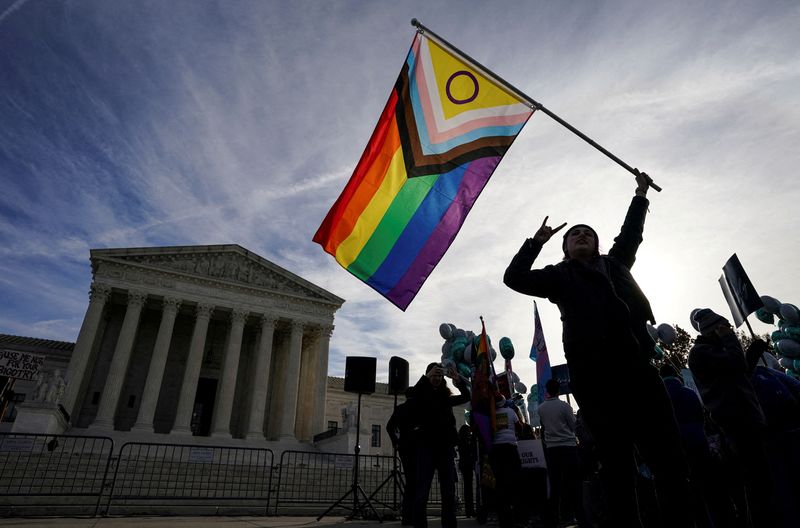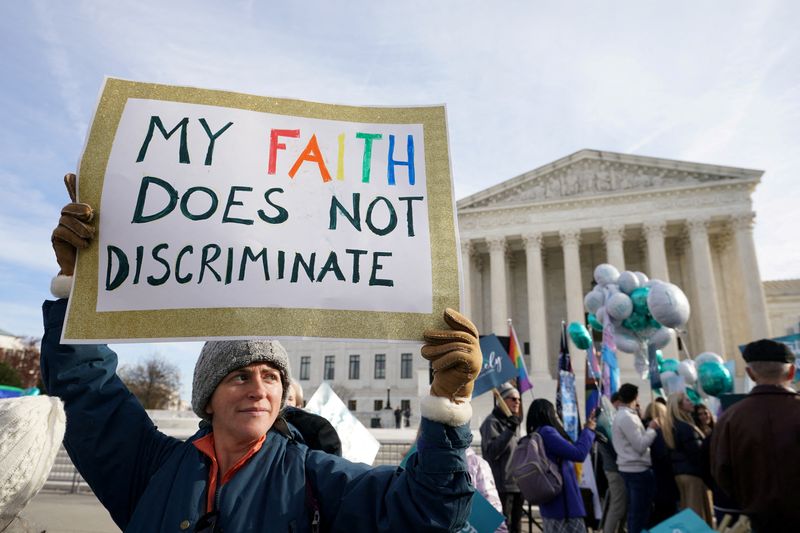By John Kruzel
WASHINGTON (Reuters) - In its decision permitting an evangelical Christian web designer to refuse service for same-sex weddings, the U.S. Supreme Court again embraced an expansive view of religious interests at the expense of protections for LGBT people.
In a 6-3 ruling on Friday powered by its conservative majority, the court backed Lorie Smith, who owns a Denver-area web design business called 303 Creative. She sued Colorado's civil rights commission in 2016 because she said she feared being punished for refusing to serve gay weddings under a state law that bars businesses open to the public from denying goods or services to people because of race, gender, sexual orientation, religion and certain other characteristics.
The ruling, citing the U.S. Constitution's First Amendment protections for free speech, stated that Colorado cannot force Smith to create speech she opposes.
Although presented to the court as a free speech claim, Smith's case shares features with other recent clashes between religiously motivated activity and civil rights laws.
"We've seen a dramatic expansion of rights for conservative religious communities that has had a detrimental impact on equality rights, certainly for LGBTQ people," said Elizabeth Platt, director of the Law, Rights and Religion Project at Columbia Law School.
Colorado is one of 22 U.S. states with measures explicitly barring discrimination based on sexual orientation and gender identity in public accommodations.
Smith, who said she opposes gay marriage based on her Christian beliefs, was represented by the Alliance Defending Freedom, a conservative religious rights group.
"The court reiterated that it's unconstitutional for the state to eliminate from the public square ideas it dislikes, including the belief that marriage is the union of husband and wife," said Kristen Waggoner, the group's president who argued the case before the court.
"Disagreement isn't discrimination, and the government can't mislabel speech as discrimination to censor it," Waggoner added.
Alliance Defending Freedom has represented other high-profile litigants before the justices including Colorado baker Jack Phillips, who refused based on his Christian beliefs to make a wedding cake for a gay couple.
In its 7-2 ruling in 2018 in the case Masterpiece Cakeshop v. Colorado Civil Rights Commission, the court decided that the commission had shown impermissible hostility toward religion when it found that Phillips violated the state anti-discrimination law by rebuffing two men who were getting married.
The justices in that case stopped short of issuing a definitive ruling on the circumstances under which people can seek exemptions from anti-discrimination laws based on religion. Still, the ruling illustrated a disparity in how the court views protections for LGBT people in contrast to the competing conservative Christian interests, Platt said.
"The court treated Jack Phillips' claim of discrimination with extreme deference and sensitivity, while entirely glossing over the discrimination against the same-sex couples in that case," Platt said.
FOSTER CARE RULING
The court in 2021 decided another dispute involving tensions between equality protections and religious freedom.
In Fulton v. City of Philadelphia, the court in a 9-0 ruling embraced religious rights over LGBT rights, siding with a Catholic Church-affiliated agency that sued after Philadelphia refused to place children for foster care with the organization because it barred same-sex couples from applying to become foster parents.
The court's composition shifted with the 2018 retirement of Justice Anthony Kennedy, who was succeeded by Justice Brett Kavanaugh, one of Republican former President Trump's three conservative appointees, along with Justices Neil Gorsuch - the author of Friday's ruling - and Amy Coney Barrett.
Kennedy was the swing vote on what then was a 5-4 conservative-majority court. He stood out among conservatives in his espousal of sympathy both for conservative Christian causes and for what is sometimes called the "dignity interests" of marginalized groups including LGBT people.
Kennedy's emphasized the dignity of gay couples in his landmark 5-4 decision in Obergefell v. Hodges that legalized same-sex marriage nationwide in 2015.
Platt said that "if Obergefell had been litigated under this Supreme Court, I don't think it would come out the same way."
The court underwent another dramatic change to its ideological composition in 2020 when Trump named Barrett to succeed the late liberal justice Ruth Bader Ginsburg. Barrett's addition gave it a 6-3 conservative margin and recalibrated how it weighed conservative Christian causes against the dignity interests of people protected by civil rights laws.

"This court continues to advance the agenda of religious extremists who are trying to force all of us to live by their narrow beliefs," said Rachel Laser, president of the secular group Americans United for Separation of Church and State.
Following Friday's ruling, Smith said, "I hope that, regardless of what people think of me or my beliefs, everyone will celebrate that the court upheld the right for each of us to speak freely."
